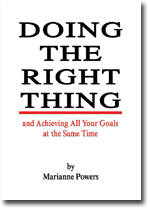A Very Interesting Question
"In your article on Office Politics in the Life in the USA Magazine, you state that office politics is the way people influence decisions in a company from outside the designated chain of command. I was wondering if you think this also applies to politics in government and if you have any hope that those of us outside the chain of command can ever influence real change. A big question I know!"
I hadn't thought about that before but, yes, only more so! In this country, the designated chain of command is only temporary. The incumbents tend to use the power they have while they have it, but they don't stop trying to influence people and events either. Everyone is trying to have their say on current affairs and the outcome of the future elections.
And in government, too, politics is not inherently bad.
Suppose that you were elected President of the United States. Suppose that you and everyone else in Washington had just one goal, to do what was good for America. People would have different opinions on what that was but suppose they didn't fight about it. Suppose each person or group saw a problem or opportunity, researched it, and talked to everyone involved to come up with the best solution or plan. Suppose they used the information they had gathered and their strong feelings about what was right to try to persuade you to support their plan. That would be politics, too. We wouldn't hear about it as much, but it would be better for us all. What we do hear about is the name-calling, the mud-slinging, the complaining. And we listen. It's interesting. But don't we also get a sickening feeling when we hear it. Because we know that as long as people are fighting, no matter which side they're on, there's no work going on, no problems being solved, no progress being made.
The problem is not that politicians disagree. They represent us and we disagree. They have to fight for what they believe, what we believe. The problem is the way they fight, just as in our own lives it is the way we fight. I can say what I think is right and why I think it's right. I can listen to you and try to understand your point of view. I can convince you or be convinced by you or we can agree to disagree. We can look for a third option that satisfies us both. But if I attack you or you attack me, we can only fight. Then you won't give in, I won't give in, even if there is something that we could accomplish together. We will fight each other even against our own best interests, just as politicians sometimes fight each other against the best interests of the people they represent and the country.
I think that politics is the way people outside the designated chain of command influence decisions in an office and in government. And that even far outside the chain of command, where we are, we have influence. What I hope we will use our influence for is to convince those who represent us, by showing them that we are doing it in our own lives, that we want them to work on problems, develop opportunities, and get some work done, and not waste time trying to destroy each other. We can start, and perhaps other people will join us, and then we can rely on what Margaret Mead observed:
"Never doubt that a small group of thoughtful, committed citizens can change the world, indeed it's the only thing that ever does."



2 Comments:
Thanks, Marianne. I like how you applied your knowledge about why people fight to politics. I too get tired of the mud slinging; it totally detracts from the good all our elected officials could be doing.
I look forward to hearing more.
Thanks, Sue!
Post a Comment
<< Home